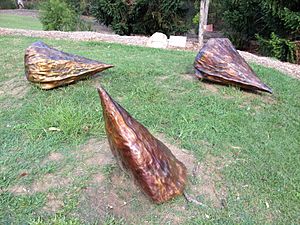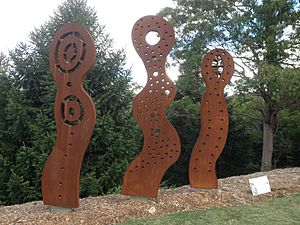Bianca Beetson facts for kids
Quick facts for kids
Dr Bianca Beetson
|
|
|---|---|
| Born |
Roma, Western Queensland
|
| Nationality | Australian |
| Education | Queensland University of Technology, Bachelor of Arts (Visual Arts - Honors) |
| Known for | Painting, sculpture, drawing, public art, photography, installation, textiles, new media, ceramics and public art |
| Movement | Contemporary Australian Aboriginal art |
| Awards | Inaugural ACHAA award for Excellence by an Aboriginal Curator at 2018 IMAGinE Awards. |

Dr. Bianca Beetson is a talented Australian contemporary artist. She creates amazing artworks using many different materials. Her art often shares stories about her culture and connection to the land.
About Bianca Beetson
Early Life and Education
Bianca Beetson was born in Roma, a town in Western Queensland. She is an Indigenous Australian and belongs to the Kabi Kabi nation. This nation is from the Sunshine Coast area in South East Queensland.
Bianca studied art at the Queensland University of Technology. She earned her Bachelor of Arts degree in visual arts between 1993 and 1995. Later, she completed her Honours in 1998. In 2018, she received her Doctorate in visual arts from Griffith University.
Her Art and Style
Bianca Beetson is known for her modern Australian Aboriginal art. She lives and works in Brisbane. Her art uses many different forms. These include painting, photography, and large art pieces called installations. She also works with new media, textiles, and public art.
In her paintings and sculptures, Bianca often uses shades of pink. Her artwork also explores her connection to "skin." This means she looks at traditional body paint designs and scarification marks. She then shows them in a new, modern way.
Public Artworks
In 2013, the Brisbane Botanic Gardens asked Bianca to create a special sculpture. This artwork is called Feast of the Bon-yi. It is made from bronze and corten steel. You can find it at the Botanic Gardens on Mount Coot-tha.
The sculpture shows a group of large nuts and spirit figures. It represents how different tribes would gather together. The nut itself is a very important symbol. It stands for something sacred. It also provides food, new beginnings, and growth. This is why people traveled long distances to gather.
 | James B. Knighten |
 | Azellia White |
 | Willa Brown |


